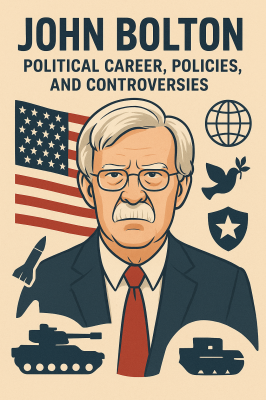Introduction
John Bolton is one of the most influential and controversial figures in modern American politics. Known for his hawkish foreign policy views, Bolton has served in several Republican administrations, including those of Ronald Reagan, George H. W. Bush, George W. Bush, and Donald Trump. His uncompromising stance on international relations, particularly regarding Iran, North Korea, and the United Nations, has made him a polarizing figure both in the United States and abroad.
This article explores John Bolton’s biography, political career, foreign policy positions, and key controversies, providing an in-depth look at why he remains a significant player in American diplomacy and security strategy.
Early Life and Education
John Robert Bolton was born on November 20, 1948, in Baltimore, Maryland. He graduated from Yale University with a degree in political science and later earned a J.D. from Yale Law School. During his time at Yale, Bolton was heavily influenced by conservative ideas that shaped his political ideology for decades to come.
Career in U.S. Government
Early Roles
Bolton began his career working in various positions under Republican administrations, including roles in the U.S. Agency for International Development and the Department of Justice. His strong conservative beliefs quickly gained him recognition within Washington circles.
U.S. Ambassador to the United Nations (2005–2006)
Perhaps one of his most well-known positions was serving as the U.S. Ambassador to the United Nations under President George W. Bush. Bolton was a vocal critic of the UN, often arguing that it was ineffective and failed to serve American interests. His tenure was marked by tensions with international diplomats and criticism over his confrontational style.
National Security Advisor (2018–2019)
John Bolton served as National Security Advisor under President Donald Trump from April 2018 to September 2019. During this period, he advocated for a tough stance on Iran, supported withdrawing from international agreements, and opposed diplomacy with North Korea. Ultimately, his disagreements with President Trump’s approach to foreign policy led to his departure.
Foreign Policy Views
Iran
Bolton has long argued for a hardline policy against Iran, openly supporting regime change and military strikes to prevent Iran from developing nuclear weapons.
North Korea
He has been one of the most vocal critics of negotiations with North Korea, insisting that Pyongyang will never give up its nuclear arsenal voluntarily.
Russia and China
Bolton sees both Russia and China as strategic threats to U.S. global leadership. He supports stronger alliances with NATO and Indo-Pacific partners to counterbalance their influence.
Key Controversies
-
Criticism of the United Nations: Bolton’s dismissive remarks about the UN created diplomatic friction.
-
Advocacy for War: His aggressive stance on military intervention has earned him the label of a “war hawk.”
-
Trump Administration Fallout: After leaving the Trump administration, Bolton published his memoir The Room Where It Happened, which contained explosive claims about Trump’s handling of foreign policy.
Legacy and Impact
John Bolton’s career represents the traditional neoconservative vision of U.S. foreign policy—prioritizing military strength, skepticism toward diplomacy, and an unwavering belief in American global dominance. Love him or hate him, Bolton remains a highly influential voice in shaping debates about America’s role in the world.
Conclusion
John Bolton continues to be one of the most debated figures in American politics. His hardline stances, influential positions in government, and outspoken criticism of both allies and adversaries ensure that his legacy will continue to shape U.S. foreign policy discussions for years to come.
